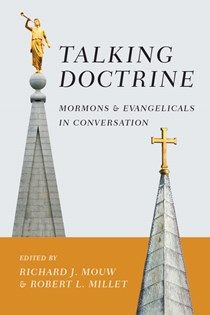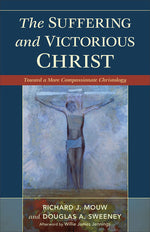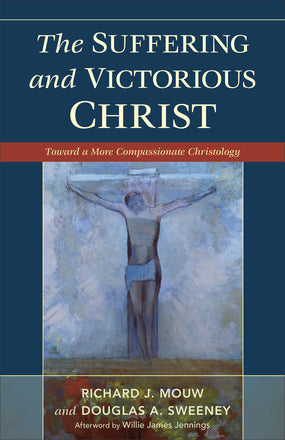- Home
- Richard Mouw
- The Suffering and Victorious Christ: Toward A More Compassionate Christology
The Suffering and Victorious Christ: Toward A More Compassionate Christology
Couldn't load pickup availability
- Binding:
- Paperback
- ISBN:
- 9780801048449
- Publisher:
- Baker Academic
ISBN: 9780801048449
Type: Paperback
American theologians tend to focus on the great hope Christians have through Christ's resurrection, emphasizing Christ's victory while minimizing or ignoring his suffering. Through their engagements with Japanese Christians and African American Christians on the topic of Christology, Richard Mouw and Douglas Sweeney have come to recognize and underscore that Christ offers hope not only through his resurrection but also through his incarnation. The authors articulate a more compassionate and orthodox Christology that answers the experience of the global church, offering a corrective to what passes for American Christology today. The book includes an afterword by Willie James Jennings of Duke Divinity School.
Contents
Introduction
1. John Williamson Nevin and the Incarnation of God
2. Franz Pieper and the Suffering of God
3. A Brief Interlude on Incarnational Presence
4. Reformed Theology and the Suffering of Christ
5. Christus Dolor among the Slaves and Their Descendants
6. The Challenge of Application: Christus Dolor in the American South
Conclusion
"Christus Victor and Christus Dolor: An Afterword" by Willie James Jennings
Resources for Christological Reflection from Our Japanese and African American Interlocutors
Index
Endorsements
"Richard Mouw and Douglas Sweeney address the 'divine empathy' of the incarnate Christ who, in the mysteries of the Trinity, not only created his fellow humans but also suffers with them. The authors' exploration of neglected themes from Lutheran and Calvinist theologians will satisfy the historically minded, and their engagement with non-European and African American believers will illuminate the universal character of the gospel. Their depiction of Christ's suffering as both absolutely unique to himself and necessary to join him completely to suffering humanity will challenge, humble, and inspire all who stop to consider the 'wond'rous cross on which the Prince of Glory died.'"
Mark Noll, University of Notre Dame; coauthor of Clouds of Witnesses: Christian Voices from Africa and Asia
"Decades ago, black liberation theologian James Cone invited white theologians to listen closely to the spiritual insights of people of color. The Suffering and Victorious Christ does just that. With sensitivity and skill, Mouw and Sweeney show how much white American Christologies can benefit from Asian and African American histories and theological reflections. As we still strive to create the 'beloved community' Martin Luther King Jr. preached of so powerfully, we need to spend time with more books like this one."
Edward J. Blum, coauthor of The Color of Christ: The Son of God and the Saga of Race in America
"Following Barth and listening to African American and Japanese voices, Mouw and Sweeney help us see that the incarnation and sufferings of Christ, properly understood, are not a forfeiting of God's glory but an expression of it. Mouw and Sweeney have helped deepen our christological moorings with a Christology that reflects in deeper ways God's redemptive work in the global church throughout space and time."
Timothy C. Tennent, president and professor of world Christianity, Asbury Theological Seminary
"This is a remarkable testimony of a theological journey in search of resources for a compassionate Christology through American Christianity. The journey starts rather unconventionally with conversations with Japanese theologians who emphasize the image of a suffering Christ in contrast to Western triumphalism. Readers are guided through the thick woods of Protestant orthodoxy, Reformed dogmatics, nineteenth-century German philosophy, Puritan New England, and the American South. Much like the figures they take up in the book, the authors refuse to endorse any one-sided argument for Christus dolor alone or for its multi-cultural adaptations. They point to the danger of over-contextualization and exploitation, both by the privileged and by the oppressed. At the end of the journey, readers will have a solid grasp of what it means to be faithful to the core of our common Christian tradition today while at the same time staying attentive to the voices of contemporary critiques. This book is for all students and professionals who take the challenge of such a theological inquiry seriously."
Anri Morimoto, vice president for academic affairs, International Christian University, Tokyo, Japan
- Weight:
- 0.1875 lb




